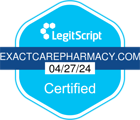
Cholesterol Levels: Understanding Risk Factors
Did you know there are usually no warning signs for high cholesterol? Monitoring levels is an important first step to determine a treatment plan.
We recently sat down with an ExactCare pharmacist to cover some common questions people may have about their cholesterol including what it is, why it’s important, risk factors and how to manage it.
- Q: What is cholesterol?
A: Cholesterol is a fatty molecule produced by the liver that is also present in dietary sources. It is used to make hormones, such as testosterone, cortisol, and vitamin D. Although necessary to the body, cholesterol can be harmful if levels are too high.
- Q: How often should cholesterol levels be checked?
A: The American Heart Association recommends adults 20 years or older have their cholesterol checked every 4-6 years, as long as their risk remains low. High risk factors include diabetes, hypertension and smoking. For those over 40, a risk score should be calculated and if levels are high, it should be checked more often. Risk scores can be calculated here.
- Q: What is the difference between LDL and HDL?
A: LDL stands for low-density lipoprotein and is considered “bad cholesterol” while HDL, or high-density-lipoprotein, is known as “good cholesterol.” Excess LDL cholesterol is stored in the walls of the arteries throughout the body and can lead to increased risk for atherosclerotic cardiovascular disease (ASCVD), heart attack, stroke and other conditions.
- Q: Could a statin help people with high cholesterol?
A: If cholesterol levels are high enough to cause health problems, a statin may be prescribed. They can be highly effective in protecting the heart and work by blocking the enzyme in the body that produces cholesterol. Statins can help keep the buildup of plaque in the arteries from getting thicker and help prevent blockage.
- Q: Can a statin be used to treat additional conditions besides high cholesterol?
A: People may be prescribed a statin if they previously had a heart attack, stroke, bypass surgery or stents. Statin therapy is recommended in people with ASCVD, an LDL greater or equal to 190, and diabetes.
- Q: Are there certain medications or foods that should be avoided if someone is taking a statin?
A: It is recommended for people who are taking a statin to eat a diet rich in fruits and vegetables, low in saturated and trans-fat, and low in salt. Grapefruit and its juice should be avoided as it can increase statin concentration and lead to unwanted side effects.
- Q: What are some common medications used to treat high cholesterol?
A: Some of the most common statins are:
- Atorvastatin (Lipitor, Atorvaliq)
- Lovastatin (Altoprev)
- Pitavastatin (Livalo, Zypitamag)
- Pravastatin (Pravachol)
- Rosuvastatin (Crestor, Ezallor)
- Simvastatin (Zocor, FloLipid)
If you are concerned about a patient’s cholesterol levels and need our support, please don’t hesitate to call 1-877-355-7225 and speak with a pharmacist.







